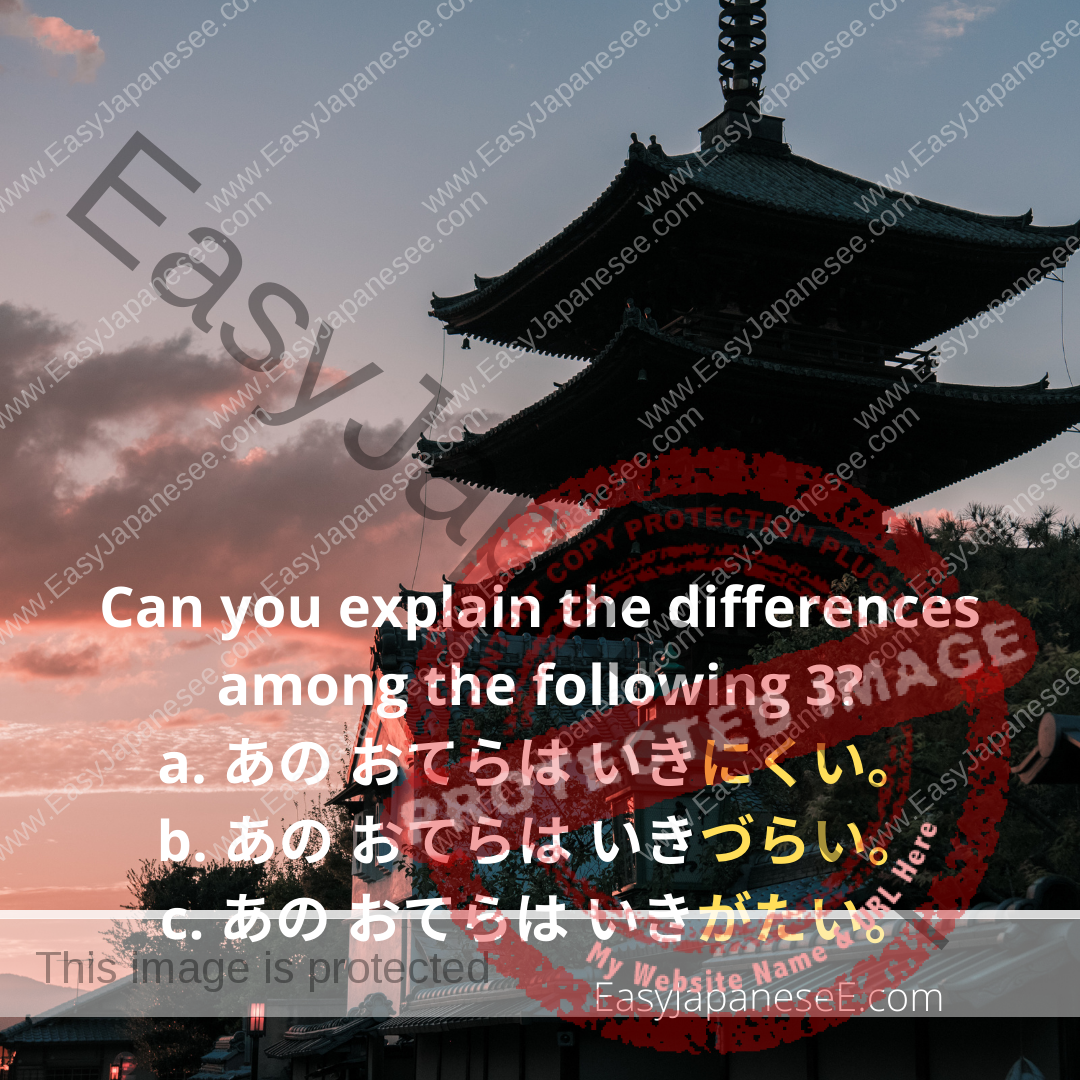Today’s Question
Can you explain the differences among the following 3?
a. あのお寺は行きにくい。
b. あのお寺は行きづらい。
c. あのお寺は行きがたい。(a slightly awkward sentence)
Today’s Grammar Point: ~がたい、~づらい、~にくい
All these 3 phrases are usually translated as “difficult to ~” or “hard to ~” but they are not quite interchangeable. I will compare these 3 today below.
Connection
[verb stem] + がたい/づらい/にくい
verb stem is the ます form verb without ます
~にくい
This is the most frequently used one among the three. It can be used both in speech and writing. If it is used with a verb for an willful action, ~にくい means it is difficult to do so but it is not impossible. ~にくい is included in the JLPT N4 list, so read this post also to understand the usage of ~にくい.
この言葉は言いにくい。
This word is hard to say (probably because it’s difficult to pronounce).カニは食べにくい。
Crabs are difficult to eat.
If it is used with a non-volitional verb, it means that does not happen easily.
このシャツは乾きにくい。
This shirt is hard to dry.プラスチックは割れにくい。
Plastic doesn’t break easily.
~づらい
The kanji for ~づらい is 辛い, which means “painful” or “cruel,” ~づらい is most often used when the willful action causes physical or psychological pain and the narrator is reluctant to do so.
この言葉は言いづらい。
This word is hard to say (as it is painful to say it to the other person).ぼくはカニを飼っているから、カニは食べづらい.
I have pet crabs, so crabs are (psychologically) painful to eat.
Traditionally ~づらい is not used with non-volitional verbs. So most people find the following 2 sentences awkward, or some people may even say they are outright wrong, although I hear more and more people are coming across these sentences these days.
(?) このシャツは乾きづらい。(?)
(?) プラスチックは割れづらい。(?)
~がたい
~がたい is the least frequently used expression out of these three and it is most often used in a written passage. ~がたい emphasizes the difficulty more than ~にくい and has the nuance of “almost impossible no matter how hard one tries.“
この言葉は言いがたい。(a bit awkward sentence)
This word is almost impossible to say (because it is so special that it does not suit the situation).カニは食べがたい。
Crabs are hard to eat (possibly because they are not readily available).
As ~がたい is not used very often, it may be easier to remember the phrases with がたい as set expressions. Try to make note of its usage whenever you come across ~がたい in passages. I will list a few below for you.
信じがたい現実
Unbelievable reality避けがたい状況
an inevitable situation許しがたい行為
conduct that cannot be condoned理解しがたい言い訳
an excuse almost impossible to understand受け入れがたい要求
a demand that is almost impossible to acceptありがたいプレゼント
a much appreciated gift (the literal meaning is “hard to exist/find”)
Note that the word ありがとう (thank you) comes from this ありがたい.
Answer to Today’s question
a. あのお寺は行きにくい means that the temple is located in a place hard to get to but, if you try, it’s not impossible to get there.
b. あのお寺は行きづらい means the narrator is reluctant to go to that temple. The reluctance may be because he/she had a bad experience in the temple before or because his/her visit to the temple may give somebody else a hard time.
c. あのお寺は行きがたい is a rather awkward sentence but it means that the narrator feels it’s almost impossible to go to that temple. That may be because the narrator feels that the temple is too holy for him/her to go to or it may be because the temple is restricting the number of visitors.

